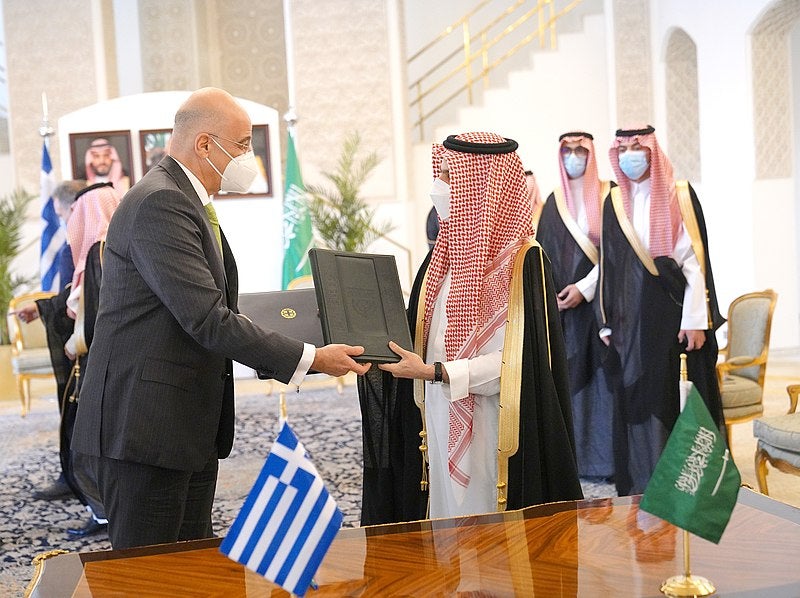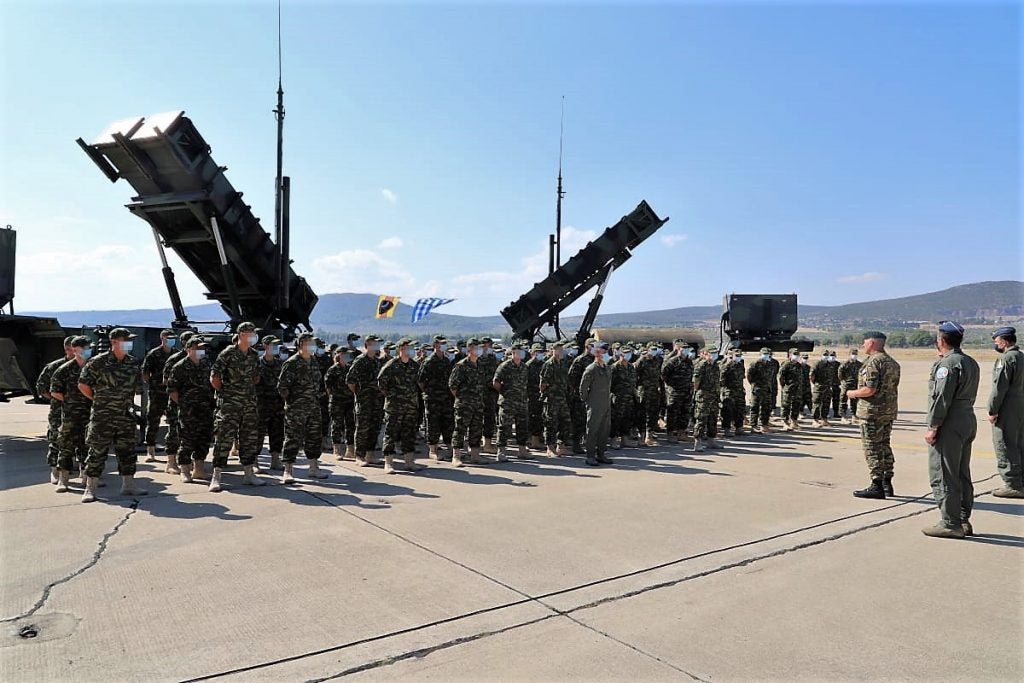Greece Sends Patriot Air Defense Missile System to Saudi Arabia
According to a written statement from the Greek General Staff, a Greek Patriot battery and more than 120 Greek Armed Forces personnel departed for Saudi Arabia on Tuesday, 14 September, 2021, with an official ceremony held at Tanagra Air Base.
Minister of National Defense Nikos Panagiotopulos, Deputy Minister of Defense Nikos Hardalias, Chief of General Staff Konstantinos Floros, Air Force Commander Georgios Bliumis, and Ambassador of the Kingdom of Saudi Arabia to Athens, Mr. Saud Faisal Saud Aldaweesh, Kuwait’s Ambassador to Athens, and Brigadier General Christopher Barber, the US Air Defense Attaché in Athens attended the farewell ceremony for the Patriot battery and the Greek military personnel to be deployed in Saudi Arabia.
Speaking at the ceremony, the Chief of the HNDS (Hellenic National Defense General Staff) Floros emphasized the mission’s positive impact on the international promotion of Greece’s defense and deterrent power, as well as the benefits of participating in a new business environment, in the context of the Greek Air Force’s interoperability, through the reinforcing of information exchange and cooperation with the Armed Forces of Saudi Arabia and the staff of other states for the same purpose.
According to Konstantinos Floros, the mission of the Greek Patriot battery to be deployed in Saudi Arabia is the culmination of the two countries’ excellent relations and vision for international and regional developments, as well as jointly contributing to the development of security and stability in the Eastern Mediterranean and the Middle East.
Following the September 2019 drone attacks on Saudi Arabian public oil company Aramco’s refineries, Greece decided to send missile systems to Saudi Arabia as part of the implementation of the “Integrated Air and Missile Defense Concept” (IAMD Concept). The official decision-making process began in January 2020. The two countries signed an agreement in April 2021 to supply a guided air defense battery to Saudi Arabia during the official visit of Greek Foreign Minister Nikos Dendias and Greek Defense Minister Nikos Panayotopoulos to Saudi Arabia.

Copyright: (CC BY-SA 2.0)
Dendias stated in his press statement following the meeting that negotiations on this issue began in 2019 and that the United States, England, and France all participated in the initiative. Minister Stelios Petsas, stated, “Giving Patriots (to Saudi Arabia) contributes to its security to protect critical energy infrastructure, promotes our country as an element of stability in the region, and strengthens our ties with Saudi Arabia. And of course, as a defense system, it doesn’t pose a threat to other countries in the region.”
The transfer of the Patriot battery comes just after the US withdrew the Patriot and THAAD air defense systems from the Prince Sultan airbase near Riyadh. According to AP, a satellite image from late August shows that some batteries had been removed from the location, but activity and vehicles could still be observed in the region at the time of the image. The high-resolution satellite image from Planet Lab indicated that the battery pads in the field were empty and there was no visible activity.
Following the removal of the Patriot air defense systems by the United States, Saudi Arabia now has 24 Patriot air defense systems, the majority of which are stationed on the Yemeni border to prevent strikes from Yemen. A Patriot air defense missile battery, which will be deployed as one of Greece’s six Patriot PAC III batteries arrives in Saudi Arabia, will help protect the Kingdom’s critical energy infrastructure and strengthen its air defense, especially against missile attacks from Iran-backed Houthi militias in Yemen.
Sent with the Battery will be an AN/MPQ-53 radar, an AN/MSQ-104 Engagement Control Station (ECS), and 2 to 4 missile launchers. Greece will not be sending missiles in addition to batteries. Saudi Arabia will fund the cost and supply of these missiles. It’s also likely that the AN/MPQ-53 radar will be upgraded to the AN/MPQ-65, a more advanced version. Furthermore, the missile launchers of the Greek Patriot battery are anticipated to be modernized in order to be compatible with PAC-3 missiles.

